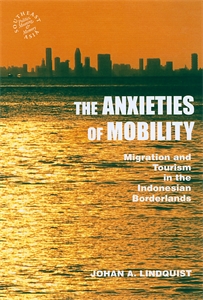The Anxieties of Mobility: Migration and Tourism in the Indonesian Borderlands
- About the Book
-
Since the late 1960s the Indonesian island of Batam has been transformed from a sleepy fishing village to a booming frontier town, where foreign investment, mostly from neighboring Singapore, converges with inexpensive land and labor. Indonesian female migrants dominate the island’s economic landscape both as factory workers and as prostitutes servicing working class tourists from Singapore. Indonesians also move across the border in search of work in Malaysia and Singapore as plantation and construction workers or maids.
Export processing zones such as Batam are both celebrated and vilified in contemporary debates on economic globalization. The Anxieties of Mobility moves beyond these dichotomies to explore the experiences of migrants and tourists who pass through Batam. Johan Lindquist’s extensive fieldwork allows him to portray globalization in terms of relationships that bind individuals together over long distances rather than as a series of impersonal economic transactions. He offers a unique ethnographic perspective, drawing together the worlds of factory workers and prostitutes, migrants and tourists, and creating a compelling account of everyday life in a borderland characterized by dramatic capitalist expansion.
The book uses three Indonesian concepts (merantau, malu, liar) to shed light on the mobility of migrants and tourists on Batam. The first refers to a person’s relationship with home while in the process of migration. The second signifies the shame or embarrassment felt when one is between accepted roles and emotional states. The third, liar, literally means “wild” and is used to identify those who are out of place, notably squatters, couples in premarital cohabitation, and prostitutes without pimps. These sometimes overlapping concepts allow the book to move across geographical and metaphorical boundaries and between various economies.
The Anxieties of Mobility is an ideal text for courses dealing with gender, globalization, and anthropology. A documentary film, B.A.T.A.M., directed and produced by the author, is available from Documentary Educational Resources.
- About the Author(s)
-
Johan A. Lindquist, Author
Johan A. Lindquist is assistant professor of social anthropology at Stockholm University.
- Reviews and Endorsements
-
- This engaging and sympathetically written book would make an excellent text for undergraduate courses on globalization, migration or the anthropology of work.
—Pacific Affairs - Many readers, particularly those looking for ethnographies accessible to undergraduates, will welcome Johan M. Lindquist’s timely topic and his engaging writing style. . . . Valuable, interesting, in many ways innovative to the field. The book is ideal for use in undergraduate courses in globalization and development, or area studies (Southeast Asia or Indonesia). . . . The Anxieties of Mobility will no doubt find a secure place in the anthropological literature on development, borderlands, gender, prostitution, and migration.
—Journal of Asian Studies - A fine-grained picture of working class Indonesians and Singaporeans who travel in opposite directions in pursuit of jobs, money, sex, drugs, legitimacy, and bright lights. They cross multiple barriers—national, urban, moral, gender, and religious—in order to attain some measure of individual success in the globalizing economies that link Singapore’s development with Indonesia’s supply of cheap migrant workers. The ethnography is rich and fascinating, and it captures a complex shifting world with delicacy, grace, and clarity.
—Aihwa Ong, University of California, Berkeley - A landmark achievement. It builds a compelling theoretical argument from a close engagement with on-the-ground ethnography, providing a unique—but uniquely telling—window into everyday dynamics of movement, place-making, intimacy, and alienation, dynamics too often glossed over as a unitary globalization. By studying a place of hyper-capitalism far removed from the images of peaceful tradition typically associated with Indonesia, Lindquist has crafted a major contribution to a range of fields, from Asian Studies to studies of migration, transnationalism, and emotion.
—Tom Boellstorff, University of California, Irvine
- This engaging and sympathetically written book would make an excellent text for undergraduate courses on globalization, migration or the anthropology of work.
- Supporting Resources
-










